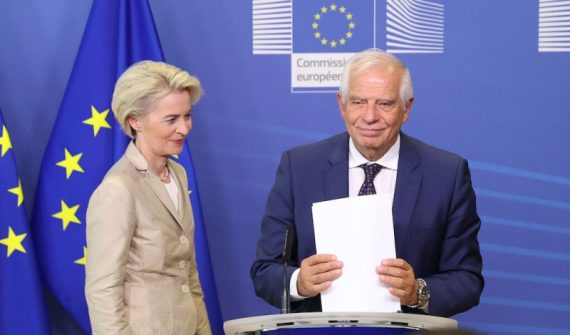I
srael has been carrying out a genocide in Gaza for almost five months now, and it seems that no one in the world has enough power to prevent it from taking place in front of the eyes of all. The number of countries that oppose the Israeli attacks is undoubtedly much greater than the number of countries that support them, but it seems that the determination and courage of those who oppose the attacks lag behind the sentiments of those who support them. The European Union appears to be the second most important actor, after the United States, in supporting and enabling Israel’s genocide against the people of Gaza.
The extent of this support can be seen in the economic and military aid given to Israel, the pro-Israel votes in the UN, and the statements of support for the attacks on Gaza. However, the EU’s Gaza policy is not a monolithic pro-Israel one. The leaders of certain EU countries, such as Spain, Ireland, and Belgium, have issued statements criticizing Israel’s massacres, and some EU officials, such as the High Representative for Foreign Affairs and Security Policy Josep Borrell have also been increasingly vocal in condemning Israel’s massacre policy and calling for a ceasefire. On the other hand, names such as Ursula von der Leyen, the president of the European Commission, have followed a policy based on the principle that the “EU is on Israel’s side” and have supported the Israeli aggression from the very beginning.
Even in the first days of the Israeli aggression, Borrell stated that Israel’s total blockade of Gaza was against international law and opposed the statements of European politicians about cutting off aid to Palestine. In the same statement, Borrell declared that Israel has the right to defend itself, but that it must do so in accordance with international law, and that some decisions by the Israeli government were contrary to this. About two weeks later, Borrell emphasized that a “humanitarian pause” in the Israeli attacks was the most important issue for the delivery of aid to people in the besieged areas. At a time when many European politicians, including von der Leyen, do not dare to talk about a humanitarian pause or a ceasefire, continuously repeating the refrain of “Israel’s right to defend itself” and shying away from criticizing the massacres Israel is committing, Borrell’s statements criticize the Israeli administration, shaking the Western world behind it and seriously disturbing the Zionist network.
In the later stages of the ongoing massacre, Borrell warned that the West should not apply double standards with regard to Gaza, saying, “While we apply international law in Ukraine, we cannot ignore it in Gaza.” He warned that the international community has failed to find a solution to the Israeli-Palestinian problem, and this failure has been expressed by the Security Council. Borrell also stated that UN Security Council could make up for it with a unanimous decision on the two-state solution. In recent weeks, as the scale of Israel’s genocide has grown, Borrell has stepped up his criticism of both Israel and the U.S., which supports Israel heavily. In a statement on February 12, when U.S. President Joe Biden expressed discomfort at the deaths of so many people in Gaza, Borrell responded, “If you think too many people have been killed, maybe you should provide fewer weapons to prevent so many people from being killed.”
In contrast to Borrell, the President of the European Commission Ursula von der Leyen made unconditional statements of support for Israel, offering no criticism of Israel’s massacres neither during nor after her support visit there. More sensible circles in Europe, including EU staff, have criticized her for this. In a letter to von der Leyen, more than 800 EU staff and diplomats wrote, “We call on you to join the leaders of the entire Union in calling for a ceasefire and the protection of civilian life.” The letter went on to say, “This is the essence of the EU’s existence,” and warned that the “EU is in danger of losing all its credibility.” Clare Daly, an independent socialist member of the European Parliament from Ireland, called von der Leyen “Ms Genocide” for her extreme pro-Israel stance and accused her of putting pressure on EU members to defend Israel.
Von der Leyen’s pro-Israel bias
Why do Borrell and von der Leyen have such different attitudes towards the ongoing Gaza genocide? In order to understand these two politicians’ attitudes, a few observations about their general political approaches are necessary. Borrell, a Spanish politician, entered politics with the Spanish Socialist Workers’ Party (PSOE), representing the Spanish center-left. Under its umbrella, he has been involved in politics in Spain and in the European Parliament, serving in various ministries, including the Spanish Foreign Ministry. He currently holds the position of High Representative for Foreign Affairs and Security Policy, known as the EU’s de facto foreign minister. German politician von der Leyen, on the other hand, has been present in politics under the umbrella of the center-right Christian Democratic Union (CDU) party in Germany, and was appointed as president of the European Commission in 2019, after holding various ministerial positions in Germany, including defense minister.
If we examine how their identities affect their approaches to the Gaza massacre, three levels of affiliation come to the fore: their duties in the EU, their affiliation to their home country, and their political party affiliations. Von der Leyen’s three identities led her to adopt a pro-Israeli stance, while Borrell’s position as high representative forced him to be pro-Israeli, while his position as a Spanish socialist politician inclined him to adopt a “neutral” line on the Gaza issue over time. When I say a “neutral” line, I mean opposing the massacres of civilians and calling for an immediate ceasefire, which is what being on the side of human rights and international law requires.
If we are to analyze the Gaza policies of both politicians in terms of their party and country affiliations, the policy of the CDU towards Israel has left its mark on Germany’s policy on this issue. Since the first chancellor Konrad Adenauer, the CDU has defined Israel’s security as one of German foreign policy’s main goals and has pursued a policy of supporting Israel under all circumstances. The reason for this extreme pro-Israeli policy is that the CDU wants to make amends for the Germany’s role in the Holocaust in World War II; however, the analysis of the foreign policy behavior of states based on international relations throws doubts on such an understanding. Interests are the main motivation behind states’ foreign policy behavior, not “paying a fee” or “conscience,” and Germany’s extreme pro-Israeli policy is determined by how the actors who shape the country’s policy, such as the CDU, define those interests.
The CDU believes that Germany’s interests are best served by pursuing a foreign policy that is compatible with the Zionist lobby. The fact that the USA, the country with the highest military and economic capacity in the world, is one of the countries where this lobby is most effective shows the foreign political rationality of actors such as the CDU, which directs German foreign policy. From this point of view, the concept of human rights, which is often expressed in Germany, is of no importance in shaping the country’s foreign policy. The most important parameter is to avoid harming Germany’s interests by positioning itself alongside the Zionist lobby and the U.S. Ursula von der Leyen is a politician who belongs to this tradition which explains why she has consistently sided with Israel.
Recommended
Borrell’s pro-human rights stance despite the Zionist lobby
Von der Leyen’s European identity also leads to the same observations. The EU’s policy towards Israel and Palestine is also in the grips of the Zionist lobby. If we were to look at how this relationship was established and developed, we encounter four types of actors. First, we see that politicians, bureaucrats, and members of the media who directly belong to the Zionist lobby have built a pro-Israeli and anti-Palestinian discourse in Europe. Second, actors who are in close contact with these lobbyists and who have reached or maintained certain positions with their support repeat the pro-Israel discourse.
The third group includes the politicians and members of the media who believe that they have no choice but to support Israel because they know that criticizing Israeli aggression will lead to the wrath of the Zionist lobby and they are afraid of the consequences. The fourth group are politicians and members of the media who stand up for human rights and justice, whatever the cost, and oppose the genocide in Gaza and Israeli aggression in general. Borrell, for example, belongs to the fourth group; the scale and uniqueness of the atrocities committed by Israel have forced him to abandon his “cautious” position and make statements against the ongoing genocide.
Borrell is a politician from Spain where the influence of the Zionist lobby is much more limited than in Germany, and belongs to the Spanish Socialist Workers’ Party, which has a successful record of standing up to the pressure of both the Zionist lobby and the United States. These facts have prevented him from being swayed like von der Leyen on issues such as respect for human rights and international law. The fact that Spanish Prime Minister Pedro Sánchez, who is also a member of the PSOE, is among the European leaders who oppose Israeli aggression and call for a ceasefire is evidence that the PSOE has a generally consistent approach to human rights and international law. However, the small number of politicians like Borrell in Europe and the strong influence of politicians like von der Leyen have meant that the EU has so far remained a spectator to the Gaza massacre.





